The Role of a Front Desk Receptionist: A Detailed Overview

In today's fast-paced and competitive world, the role of a front desk receptionist has become increasingly important in creating a positive first impression for visitors and clients to an organization. Front desk receptionists are responsible for managing phone calls, greeting visitors, scheduling appointments, and handling administrative tasks, among other duties. While the requirements for the job may vary, possessing strong communication and organizational skills, computer proficiency, and a professional demeanor are essential.
This article will provide an overview of the responsibilities, skills, tools and technologies, education and training, career development, job opportunities, and government programs related to the front desk receptionist job. By understanding the key aspects of this role, job seekers and current front desk receptionists can position themselves for success and growth in their careers.
1. Job description
A front desk receptionist is an individual who is typically the first point of contact for visitors, clients, and employees when they enter an organization. They are responsible for greeting people, answering phones, scheduling appointments, managing deliveries, and handling inquiries. They play a crucial role in creating a positive impression of the organization and ensuring that visitors and clients are directed to the appropriate person or department. Front desk receptionists are usually employed in a wide range of settings, including corporate offices, hospitals, clinics, hotels, and government offices. They are required to have strong communication and interpersonal skills, as well as excellent organizational and administrative abilities. Additionally, they may need to have knowledge of various computer programs and office equipment, such as printers, copiers, and scanners.
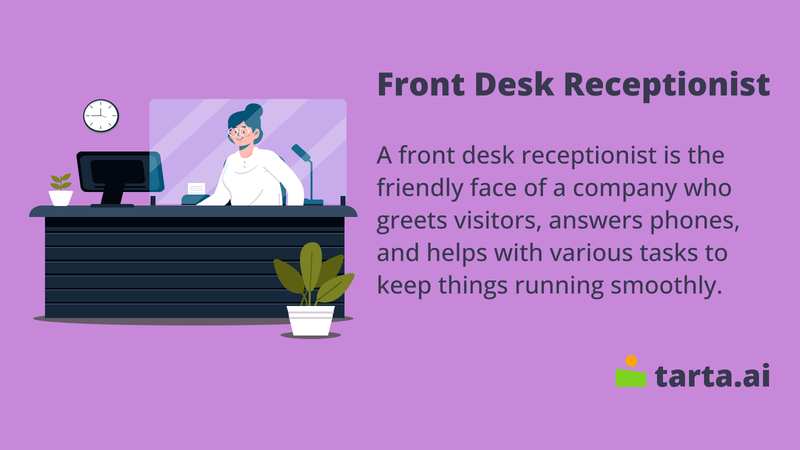
Requirements
The requirements for a front desk receptionist may vary depending on the organization and the specific job. However, some common requirements may include:
- Education: A high school diploma or equivalent is typically required for a front desk receptionist position. Some employers may require additional education or training, such as an associate's degree in business administration or a related field.
- Experience: Previous experience working in a customer service or administrative role may be preferred or required. This can include experience working as a receptionist, administrative assistant, or in a related role.
- Communication skills: A front desk receptionist must have excellent communication skills, including the ability to communicate clearly and professionally with visitors, clients, and employees. They must also have strong writing skills and the ability to compose professional emails and other written correspondence.
- Organizational skills: A front desk receptionist must be highly organized and able to manage multiple tasks simultaneously. They must be able to prioritize tasks, meet deadlines, and maintain accurate records.
- Computer skills: A front desk receptionist must be proficient in using basic computer programs, such as Microsoft Office and email. They must also be able to learn and use specialized software programs used in their organization.
- Interpersonal skills: A front desk receptionist must be able to build positive relationships with visitors, clients, and employees. They must be friendly, approachable, and able to handle difficult situations with tact and diplomacy.
- Professionalism: A front desk receptionist must maintain a professional demeanor at all times. This includes dressing professionally, maintaining a neat and tidy appearance, and exhibiting a positive attitude.
Overall, a front desk receptionist must possess a range of skills and abilities to perform their job effectively. They play a critical role in creating a positive first impression of the organization and must be able to handle a wide range of tasks and responsibilities with professionalism and efficiency.
Duties and responsibilities
The job description for a front desk receptionist may vary depending on the organization, but some common responsibilities include:
- Greeting visitors: The receptionist is responsible for greeting visitors and making them feel welcome. This involves offering a friendly smile, providing directions, and answering any questions visitors may have.
- Answering phones: The receptionist is responsible for answering incoming calls and directing them to the appropriate person or department. They may also take messages or provide general information to callers.
- Scheduling appointments: The receptionist is responsible for scheduling appointments for clients or visitors. This involves coordinating with the appropriate personnel and ensuring that the schedule is maintained.
- Maintaining records: The receptionist is responsible for maintaining records of visitors, appointments, and phone calls. This includes accurately recording information and updating databases as necessary.
- Managing deliveries: The receptionist is responsible for receiving and distributing mail, packages, and other deliveries. This involves tracking deliveries and notifying recipients when packages arrive.
- Handling inquiries: The receptionist is responsible for handling inquiries from visitors, clients, and employees. This involves providing general information about the organization, its services, and its policies.
- Performing administrative tasks: The receptionist may be responsible for performing administrative tasks, such as typing, filing, and photocopying. They may also assist with other tasks as assigned by their supervisor.
Also, some additional duties of a front desk receptionist may include:
- Managing office supplies: The receptionist may be responsible for managing the inventory of office supplies and ordering new supplies when necessary. They may also be responsible for tracking expenses related to office supplies.
- Coordinating events: The receptionist may be responsible for coordinating events, such as meetings, conferences, and training sessions. This involves scheduling the event, arranging for equipment and supplies, and coordinating with participants.
- Managing the reception area: The receptionist is responsible for keeping the reception area clean and tidy. This includes organizing magazines, brochures, and other reading materials, as well as ensuring that the seating area is comfortable for visitors.
- Providing administrative support: The receptionist may be responsible for providing administrative support to other departments or personnel within the organization. This includes tasks such as preparing reports, organizing files, and managing calendars.
- Managing visitor access: The receptionist may be responsible for managing access to the building or office. This involves checking identification, issuing badges or passes, and monitoring the entry and exit of visitors.
- Handling financial transactions: The receptionist may be responsible for handling financial transactions, such as collecting payments or processing invoices. They may also be responsible for managing petty cash or maintaining financial records.
Overall, the duties of a front desk receptionist may vary depending on the organization and its needs. They are often required to be adaptable and able to handle multiple tasks simultaneously. A front desk receptionist is an important member of an organization's team, providing essential administrative support and creating a positive first impression for visitors and clients.
Hard and soft skills
The skills required for a front desk receptionist can be divided into two categories: hard skills and soft skills.
Hard skills are specific technical abilities or knowledge that can be learned through education or training. And soft skills are personal attributes that enable an individual to interact effectively with others.
Hard skills | Soft skills |
Computer skills This includes proficiency in using basic computer programs, such as Microsoft Office and email, as well as specialized software programs used in the organization. | Communication skills This includes the ability to communicate clearly and professionally with visitors, clients, and employees. |
Administrative skills This includes skills such as filing, data entry, and record keeping. | Customer service skills This includes the ability to provide excellent customer service and handle difficult situations with tact and diplomacy. |
Knowledge of office equipment This includes knowledge of basic office equipment such as printers, copiers, and scanners. | Interpersonal skills This includes the ability to build positive relationships with visitors, clients, and employees. |
Organizational skills This includes the ability to manage multiple tasks simultaneously, prioritize tasks, and maintain accurate records. | |
Professionalism This includes maintaining a professional demeanor at all times, dressing professionally, and exhibiting a positive attitude. |
Overall, a front desk receptionist must possess a combination of hard and soft skills to perform their job effectively. They play a critical role in creating a positive first impression of the organization and must be able to handle a wide range of tasks and responsibilities with professionalism and efficiency.
2. Salary
The salary of a front desk receptionist can vary depending on various factors such as location, experience, and industry. According to data from PayScale, the national average salary for a front desk receptionist in the United States is around $30,000 per year, with a range of $21,000 to $39,000 per year.
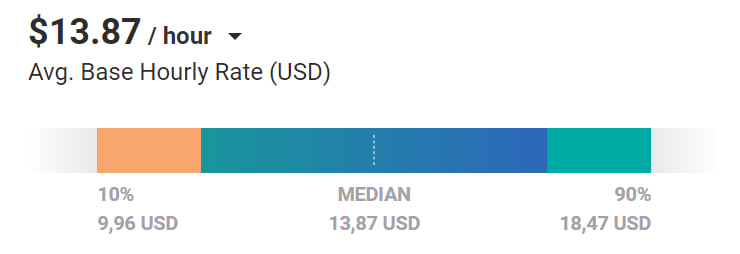
Source: PayScale
Tip:
Research the average salary for your position in your area and compare it to your current salary to determine if you are being paid fairly.
The salary rate for a front desk receptionist can vary by state due to factors such as cost of living, demand, and industry. Here is a breakdown of the average annual salary for front desk receptionists in some states, according to data from the Bureau of Labor Statistics as of May 2020:
State | Salary | State | Salary |
District of Columbia | $38,910 | Massachusetts | $36,260 |
Connecticut | $35,880 | Alaska | $35,720 |
Washington | $35,620 | New York | $35,490 |
California | $35,230 | Vermont | $34,950 |
It's important to note that these figures are only meant to provide a general idea of the salary range for a front desk receptionist by state, and individual salaries may vary widely based on experience, industry, and other factors.
Ways to improve earnings
There are several ways to improve earnings as a front desk receptionist , including:
- Gain additional skills: Learning new skills such as proficiency in different software programs, additional languages, or developing expertise in a specific area like medical terminology, legal or financial terminology can increase your marketability and potential for earning more.
- Seek promotions or additional responsibilities: Ask for additional responsibilities or to be promoted within your company. Advancing your career or taking on more responsibilities within your organization can increase your pay and benefit package.
- Negotiate salary: If you are currently employed, but feel that you are being paid less than you deserve, it may be appropriate to negotiate a higher salary with your employer. Before negotiating, research the market rate for your position in your area and highlight your value to the company.
- Pursue higher education: Obtaining a degree or certification in your field can provide you with more career opportunities and increase your earning potential. Consider pursuing higher education while working or seek out scholarship or financial aid programs to help with the cost.
- Explore job opportunities in higher paying industries: Certain industries, such as healthcare or finance, typically offer higher salaries for front desk receptionist roles. Consider exploring job opportunities in these industries or with companies that have a history of offering higher salaries.
- Consider relocating: Certain geographic regions offer higher salaries for front desk receptionist roles than others. Research salaries in different regions or cities to see if relocating may increase your earning potential.
Remember that salary is not the only factor to consider when evaluating job opportunities. Consider the benefits package, work-life balance, and growth opportunities when making career decisions.
Tip:
Ask your supervisor or colleagues for feedback on your performance and areas where you can improve. Improving your performance can lead to promotions and higher pay.
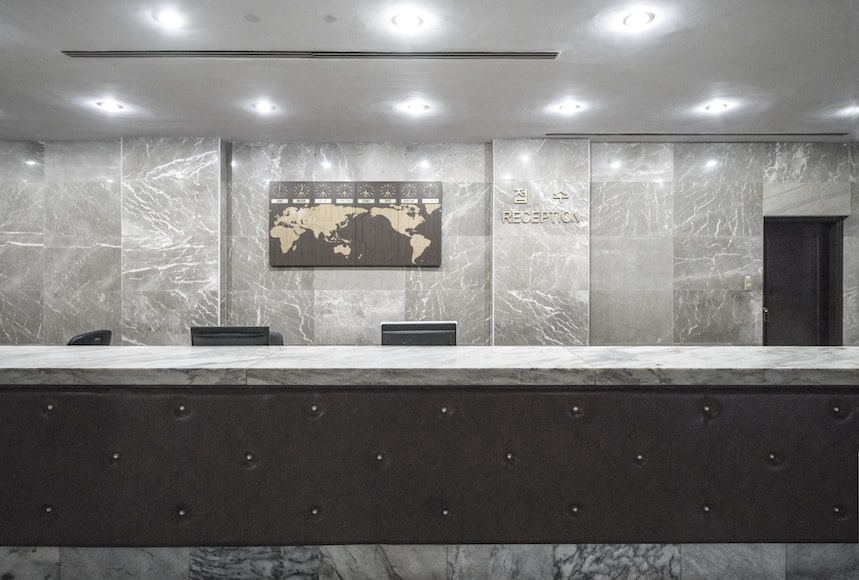
Photo: Random Institute/Unsplash
Additional benefits
In addition to salary, many front desk receptionist positions offer additional benefits. Here are some of the most common benefits that may be available:
- Health insurance: Many companies offer health insurance benefits to their employees, which can include medical, dental, and vision coverage.
- Retirement savings plans: Employers may offer retirement savings plans such as 401(k) or pension plans, which can help you save for retirement.
- Paid time off: Many companies offer paid time off for vacation, sick days, and holidays.
- Tuition reimbursement: Some employers may offer tuition reimbursement or assistance for employees who want to pursue higher education or professional development.
- Employee discounts: Companies may offer employee discounts on products or services.
- Flexible work arrangements: Some employers offer flexible work arrangements, such as working from home or flexible schedules.
- Career advancement opportunities: Many companies offer opportunities for career advancement, such as promotions or internal job postings.
- Training and development: Employers may offer training and development programs to help employees improve their skills and advance their careers.
It's important to consider these additional benefits when evaluating job opportunities, as they can greatly impact your overall compensation package and quality of life.
3. Job environment
As a front desk receptionist, you will be the first point of contact for visitors, clients, and employees at your workplace. Therefore, it is essential to create a welcoming and organized environment to make a good impression and maintain productivity. Here are some job environment settings to consider:
- Comfortable seating: Provide comfortable seating for your visitors and clients, such as chairs with adequate back support and cushioning.
- Adequate lighting: Ensure that the reception area is well-lit, with sufficient natural light and adjustable lighting fixtures to accommodate different preferences.
- Clean and clutter-free space: Keep the reception area clean, organized, and free from clutter to make a good impression on visitors and create a sense of order and professionalism.
- Informational materials: Provide informational materials such as brochures, newsletters, and other relevant materials to educate visitors about your company or organization.
- Signage: Clearly label the reception area with signage that is easy to read and understand, including directions to restrooms, conference rooms, and other areas of the building.
- Computer and phone systems: Ensure that the computer and phone systems are fully operational and easy to use, with adequate software and training available to support efficient operation.
- Security measures: Implement appropriate security measures such as access control, CCTV cameras, and visitor badges to maintain safety and security in the reception area.
- Refreshment station: Provide a refreshment station for visitors, including coffee, tea, water, and snacks, to make them feel more comfortable while waiting.
By implementing these job environment settings, you can create a professional, welcoming, and productive environment for your front desk receptionist role.
Tip:
Keep up-to-date with changes in the organization, industry, or technology that may affect your job. This will enable you to provide the best possible support and service to visitors and clients.
Also, there are tools and technologies used at work as a front desk receptionist that may vary depending on the organization or industry. However, here are some commonly used tools and technologies for the role:
- Computer and software: A computer is essential for managing appointments, maintaining client databases, and performing administrative tasks. Commonly used software includes Microsoft Office Suite, email clients, and calendar applications.
- Phone systems: A phone system is necessary to answer calls, take messages, and transfer calls to the appropriate department or person. Most organizations use multi-line phone systems that enable receptionists to handle multiple calls simultaneously.
- Electronic appointment scheduling software: Electronic appointment scheduling software helps receptionists manage client appointments, send reminders, and update calendars. Examples include Calendly, Acuity Scheduling, and Square Appointments.
- Point of sale (POS) systems: POS systems are commonly used in hospitality, retail, and healthcare industries. They allow receptionists to process payments, issue receipts, and manage inventory.
- Security systems: Security systems include access control systems, surveillance cameras, and alarm systems. These are necessary to ensure the safety of employees, clients, and visitors.
- Customer relationship management (CRM) systems: CRM systems help manage customer interactions and improve customer satisfaction. These systems allow receptionists to track client interactions, manage client data, and generate reports.
- Fax machines and scanners: Fax machines and scanners are necessary for sending and receiving documents. They are particularly useful for healthcare and legal industries, where hard copies of documents are required.
- Social media platforms: Social media platforms like LinkedIn, Facebook, and Twitter are useful for marketing and communication purposes. Receptionists can use these platforms to promote events, engage with clients, and share company news.
By utilizing these tools and technologies, front desk receptionists can efficiently manage appointments, communicate with clients, and improve the overall client experience.
4. Education
A front desk receptionist is typically the first point of contact for customers, clients, and visitors when they enter an office or business. Therefore, excellent communication, customer service, and organizational skills are essential for this role. Here are some educational options that could help you become a successful front desk receptionist:
- High School Diploma: A high school diploma or equivalent is often the minimum requirement for a front desk receptionist position.
- Certificate or Diploma Programs: Many community colleges and vocational schools offer certificate or diploma programs in office administration, receptionist training, or customer service. These programs typically provide training in communication, computer skills, and office management.
- Associate Degree: An associate degree in business administration, office management, or a related field can provide a more in-depth education and help you stand out from other applicants.
- Online Courses: Many online platforms offer courses in customer service, communication, and office administration that can be completed at your own pace.
- On-the-Job Training: Many front desk receptionist positions provide on-the-job training, so you can learn the specific tasks and procedures required by your employer.
In addition to formal education, there are several certification programs available for front desk receptionists, which can help enhance skills, demonstrate knowledge and proficiency, and stand out to potential employers. Here are some examples of certification programs for front desk receptionists:
- Certified Front Desk Representative (CFDR) by the American Hotel and Lodging Educational Institute: This certification program is designed for those working in the hospitality industry as front desk representatives. It covers topics such as guest service, reservations, and revenue management.
- Certified Receptionist (CR) by the National Association of Certified Receptionists: This certification program is designed for receptionists in all industries. It covers topics such as communication skills, telephone etiquette, and time management.
- Certified Administrative Professional (CAP) by the International Association of Administrative Professionals: This certification program is designed for administrative professionals, including front desk receptionists. It covers topics such as communication, technology, and project management.
- Microsoft Office Specialist (MOS) certification: This certification program is designed for those who want to demonstrate their proficiency in Microsoft Office software, including Word, Excel, PowerPoint, and Outlook. Front desk receptionists often use these programs to create documents, spreadsheets, presentations, and emails.
Certification programs typically require passing an exam and sometimes require specific education or work experience. Obtaining a certification can help you advance your career and increase your earning potential.
Tip:
Take initiative to identify areas where you can contribute and take on additional responsibilities. This can demonstrate your value to the company and increase your chances of being promoted or receiving a raise.
Overall, it's important to develop strong communication and customer service skills, as well as proficiency in common office software and equipment. Shadowing or observing experienced front desk receptionists in action can also be helpful.
5. Career path
As a front desk receptionist, there are several ways to develop your career and improve your skills, including:
- Attend training programs: Look for training programs that offer courses in communication skills, customer service, time management, and other relevant skills that can help you improve your performance as a receptionist.
- Build relationships with colleagues: Networking with your colleagues and developing relationships with them can help you learn from their experiences and gain valuable insights that can help you grow professionally.
- Learn new technologies: Keep up-to-date with the latest technology and software used in your workplace, such as CRM software, office suites, and scheduling software. This can help you streamline your work and make you more efficient.
- Take on additional responsibilities: Consider taking on additional responsibilities such as training new employees, managing the front desk team, or assisting with marketing and sales activities. This can help you gain experience and expand your skill set.
- Pursue higher education: Consider pursuing a degree or certification in a relevant field such as hospitality, business administration, or customer service. This can help you advance your career and qualify for higher-level positions.
- Network: Attend industry events and connect with other professionals in your field. Building your network can lead to job opportunities and higher salaries.
Remember, career development is a continuous process. As you gain more experience and knowledge, don't be afraid to set new goals and continue to learn and grow in your role.
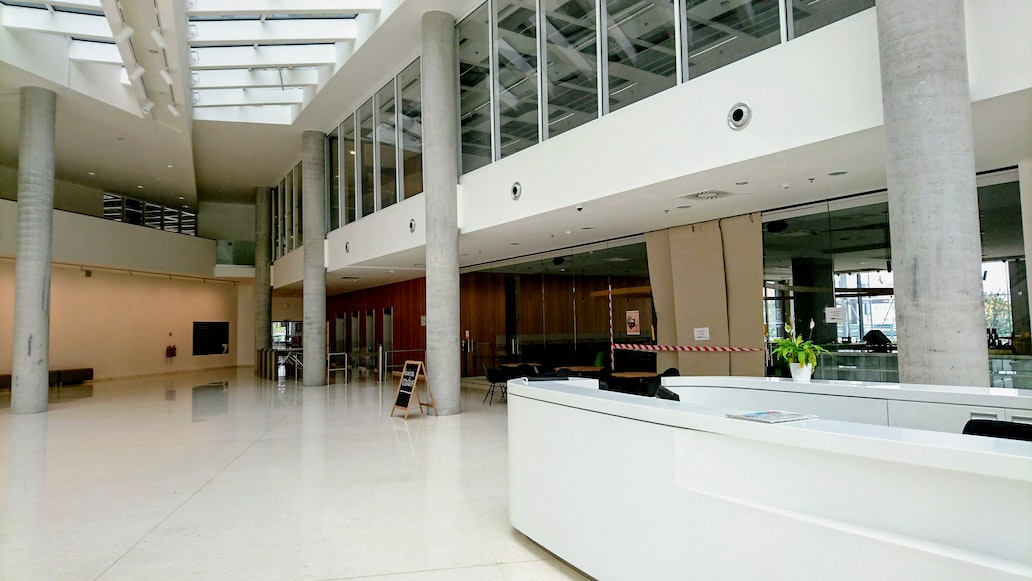
Photo: Mar Ko/Unsplash
Subfields refer to specialized areas within a larger field. In the context of career development, subfields can refer to specific areas of expertise or specialization that you can focus on to advance your career. As a front desk receptionist, some subfields that you could explore include:
Subfield | Description |
Customer service | Specializing in customer service can involve developing strategies to improve the customer experience, managing customer complaints, and training other employees in customer service best practices. |
Administrative support | Focusing on administrative support can involve developing skills in scheduling, record-keeping, and managing office logistics, such as ordering supplies and maintaining equipment. |
Sales and marketing | Specializing in sales and marketing can involve assisting with sales campaigns, conducting market research, and helping to create marketing materials. |
Hospitality | Specializing in hospitality can involve developing knowledge of the hospitality industry, including hotels, restaurants, and event planning. This could involve working with clients to coordinate events, managing reservations, and ensuring a positive guest experience. |
Technical skills | Specializing in technical skills can involve becoming proficient in software programs and technology used in your workplace, such as CRM software, scheduling software, and office suites. This could help you become an expert in the technology used in your industry and position yourself as a valuable resource for your organization. |
Remember, these are just a few examples of subfields that you could explore as a front desk receptionist. As you gain experience and knowledge, consider identifying areas that interest you and exploring ways to develop expertise in those areas.
Tip:
A front desk receptionist plays an important role in creating a positive first impression of the organization. Provide excellent customer service by answering questions, addressing concerns, and providing assistance when needed.
As a front desk receptionist, there are several alternative career options that you could explore, including:
- Administrative Assistant: Administrative assistants provide support to an organization by performing clerical tasks, scheduling appointments, managing communications, and coordinating logistics. This role requires strong organizational and communication skills, which are also key skills for front desk receptionists.
- Customer Service Representative: Customer service representatives interact with customers to resolve issues, answer questions, and provide support. This role requires strong communication skills and the ability to remain calm under pressure, skills that are also essential for front desk receptionists.
- Event Planner: Event planners coordinate all aspects of an event, from planning and logistics to execution and follow-up. This role requires excellent organizational skills, attention to detail, and the ability to manage multiple tasks simultaneously, skills that are also valuable for front desk receptionists.
- Sales Representative: Sales representatives sell products or services to customers, often by conducting market research, making sales calls, and creating presentations. This role requires excellent communication and negotiation skills, skills that are also important for front desk receptionists who often interact with customers.
- Human Resources Assistant: Human resources assistants provide support to the HR department by managing employee records, coordinating training sessions, and assisting with recruiting and hiring activities. This role requires strong organizational skills, attention to detail, and the ability to manage confidential information, skills that are also valuable for front desk receptionists.
Remember, there are many career options available to you based on your interests, skills, and experience. Consider exploring different roles and industries to find a career that aligns with your goals and aspirations.
6. Job market
Demand for front desk receptionist
Front desk receptionists are important in many industries, including healthcare, hospitality, and retail, among others. They are responsible for greeting visitors, answering phones, scheduling appointments, and providing general customer service.
The Bureau of Labor Statistics (BLS) tracks employment data for receptionists. According to the BLS, the number of jobs was 1,037,100 in 2021, employment of receptionists in the United States is projected little to no change from 2021 to 2031. However, the specific demand for front desk receptionists may vary by industry and geographic location.
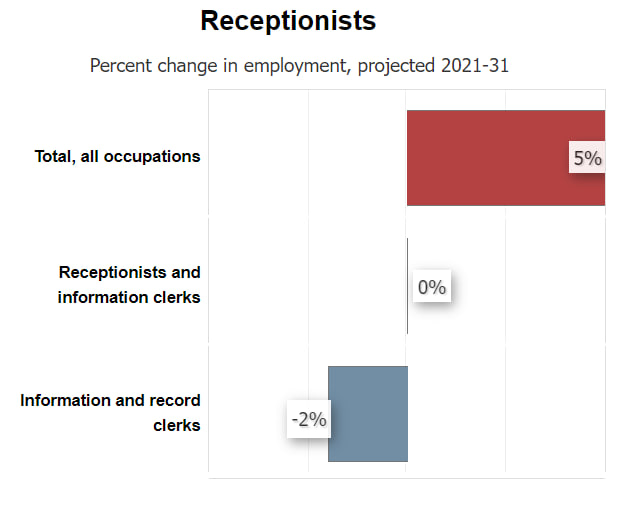
Source: U.S. Bureau of Labor Statistics, Employment Projections program
Also, the COVID-19 pandemic has significantly impacted the job market, including the demand for receptionists. Some businesses have closed or reduced their hours, while others have shifted to remote work or reduced in-person staffing. As the situation continues to evolve, it's important to keep up-to-date on the latest job market trends and opportunities.
Part-time jobs
Part-time job opportunities for front desk receptionists can be found in a variety of industries, including healthcare, hospitality, education, and more. Some employers may also offer flexible scheduling or remote work options.
To find part-time job opportunities for front desk receptionists, you can start by searching online job boards. Use keywords such as "part-time receptionist," "front desk associate part-time," or "part-time office assistant" to narrow your search. You can also check with staffing agencies that specialize in administrative and support roles, as they may have temporary or part-time positions available.
Another option is to network with professionals in your industry or field of interest. Attend industry events or join professional organizations to connect with others and learn about potential job opportunities. You can also reach out to former colleagues or classmates to inquire about any openings or recommendations they may have.
When applying for part-time front desk receptionist positions, be sure to tailor your application materials to each job and highlight any relevant skills and experience. This may include experience working in a customer service role, proficiency in office software such as Microsoft Office, and excellent communication skills. Additionally, be prepared for interviews and assessments, and demonstrate your ability to work independently and as part of a team.
7. Job satisfaction
The front desk receptionist is often the first point of contact for visitors, clients, and customers in a business or organization. Here are some potential pros and cons of working as a front desk receptionist:
Pros | Cons |
Interaction with people As a front desk receptionist, you will have frequent interaction with different types of people, including visitors, clients, and coworkers. This can provide a social and dynamic work environment. | Repetitive tasks Front desk receptionists may have to perform the same tasks repeatedly, such as answering phone calls and greeting visitors. This can become monotonous and may lead to boredom. |
Developing communication skills Constant communication with different people can help you develop your communication skills, including verbal, nonverbal, and written communication. | High-stress environment Front desk receptionists may encounter challenging situations, such as handling difficult clients or managing a busy lobby. This can lead to stress and pressure. |
Building organizational skills Front desk receptionists often handle multiple tasks and responsibilities, such as scheduling appointments, managing emails, and answering phone calls. This can help you develop and improve your organizational and time management skills. | Limited career advancement Front desk receptionist roles may not offer significant opportunities for career advancement, and some may view it as an entry-level position. |
Exposure to diverse work tasks Front desk receptionists may be tasked with a variety of responsibilities, including administrative tasks, data entry, and customer service. This can provide exposure to different work tasks and skill sets. | Lower salary Front desk receptionist roles may not offer a high salary compared to other positions within an organization. |
Overall, the front desk receptionist role can provide valuable communication and organizational skills, but may also come with some repetitive tasks, high stress levels, limited career advancement, and a lower salary.
8. Government programs
There are several government programs in the US that may benefit front desk receptionists, including:
- Workforce Investment Act (WIA): The WIA provides funding for job training and education programs for low-income individuals, including front desk receptionists. The program helps individuals acquire the skills and training they need to find better-paying jobs.
- Job Corps: Job Corps is a federal program that provides job training and education to low-income individuals aged 16-24. The program offers training in various fields, including administrative and clerical work, which may benefit front desk receptionists.
- Trade Adjustment Assistance (TAA): TAA is a program that provides job training, job search and relocation allowances, and other support services to workers who have lost their jobs as a result of foreign trade. Front desk receptionists who have lost their jobs due to trade-related reasons may be eligible for TAA benefits.
- Vocational Rehabilitation: Vocational Rehabilitation is a federal-state program that provides training and support services to individuals with disabilities to help them prepare for, obtain, and maintain employment. Front desk receptionists with disabilities may be eligible for Vocational Rehabilitation services.
- Work Opportunity Tax Credit (WOTC): WOTC is a federal tax credit available to employers who hire individuals from certain target groups, including veterans, individuals receiving Temporary Assistance for Needy Families (TANF), and ex-felons. Front desk receptionists who fall into one of these target groups may benefit from the WOTC program.
It's important to note that eligibility for these programs varies depending on the specific program and individual circumstances. Interested individuals can contact their local American Job Center for more information and assistance in determining eligibility.
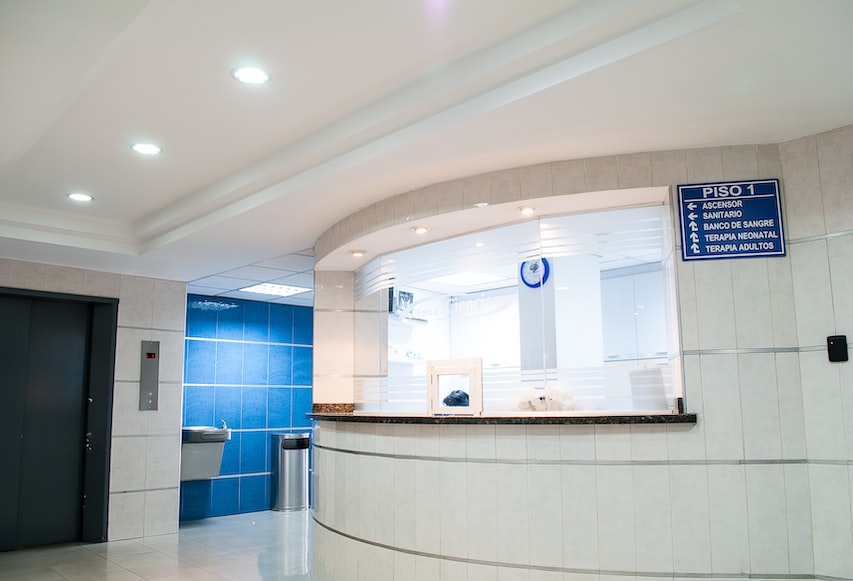
Photo: Martha Dominguez de Gouveia/Unsplash
The front desk receptionist plays a crucial role in creating a positive first impression for visitors and clients to an organization. From managing phone calls to handling administrative tasks, the front desk receptionist must possess strong communication and organizational skills, computer proficiency, and a professional demeanor. By creating a welcoming and organized environment and utilizing various tools and technologies, front desk receptionists can efficiently manage appointments, communicate with clients, and improve the overall client experience. Continuous education and training, career development, and exploring job opportunities in various industries can also help front desk receptionists enhance their skills and advance in their careers. By understanding the responsibilities, skills, tools and technologies, education and training, career development, job opportunities, and government programs related to the front desk receptionist job, job seekers and current front desk receptionists can position themselves for success and growth in their careers.
FAQ
What does a front desk receptionist do?
A front desk receptionist is responsible for greeting visitors, answering phones, handling emails and messages, scheduling appointments, managing files, and other administrative tasks to ensure the smooth operation of an office or organization.
What skills and qualities are required for a front desk receptionist?
A front desk receptionist should have excellent communication, customer service, and interpersonal skills, as well as strong organizational, multitasking, and problem-solving abilities. They should also be computer literate and have knowledge of office equipment.
What education or experience is required to become a front desk receptionist?
Most front desk receptionist positions require a high school diploma or equivalent, although some may require post-secondary education or previous office or customer service experience.
What are some common challenges faced by front desk receptionists?
Some common challenges include dealing with difficult customers or situations, managing a high volume of calls and visitors, multitasking and prioritizing tasks, and staying organized in a fast-paced environment.
What are some tips for success as a front desk receptionist?
Some tips include maintaining a positive attitude, practicing good time management and organization, developing strong communication and customer service skills, and staying up-to-date with relevant technology and software. It's also important to be adaptable, flexible, and able to handle unexpected situations.